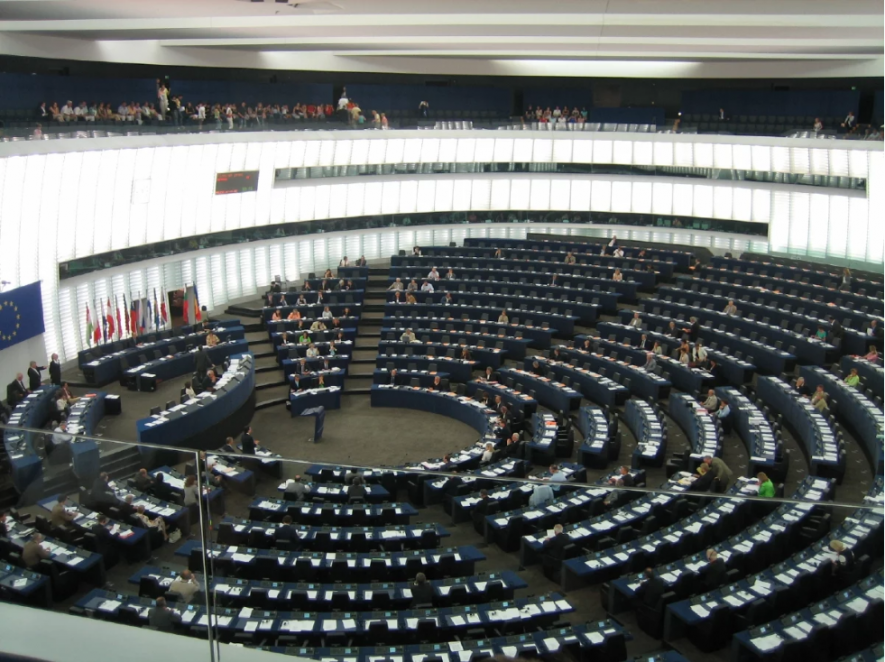Copyright Law Reform in Europe Likely to Strengthen Monopoly of Internet Giants

The proposal will now be discussed further before finally being voted on again by the European parliament next year. Photo: JMason/Wikimedia Commons
The controversial set of reforms for EU’s copyright laws was adopted on September 12 by the European parliament, with 438 votes in favor, 226 against and 39 abstentions. The law is supposedly meant to prevent the profits of content producers and publishers from being sapped by content sharing platforms such as Facebook and YouTube, and search engines such as Google.
Observers have pointed out that the reforms impose significant limitations on the ability of internet users to share and access information. Many experts – including pioneers of the internet – have warned that these reforms, far from weakening the hold of giants like Google and Facebook, will actually affect smaller firms and startups who cannot afford the compliance costs, allowing the former to further strengthen their monopoly power.
On July 5, the reforms had been rejected by the same body due to the concerns raised by numerous rights organizations and senior academicians regarding Articles 11 and 13 of the proposed directive. This time, with only minor amendments to these articles which failed to address the original concerns, the EU parliament passed the bill, clearing the way for the next phase which will include negotiations between the parliament and the European Council, which will be representing the member-state governments. Following this, the final agreement between the negotiating parties will be voted on again by the parliament before mid next-year.
Dubbed as “link tax” by critics, Article 11 sought to make it mandatory for the “information society” to acquire licenses from publishers in order to be permitted to display on their platforms “entire publications or articles but also of parts of press publications”.
The ambiguity of the language used in drafting this Article would have made it possible to include everything from headlines to hyperlinks to be brought under licensing agreements.
The Members of European Parliament (MEPs) who voted in favour of the bill claim that this problem in the previous draft has been corrected by amending this Article, by adding a new paragraph which states that the copyright protections mandating licensing requirement “shall not extend to mere hyperlinks, which are accompanied by individual words.”
However, the use of “individual words” in the sentence implies a prohibition on displaying quotes, phrases, headlines, snippets or photographs in the articles – which is usually how a shared hyperlink is displayed – without working out a license agreement with the publisher who holds copyrights on the said content.
While the amendment allows hyperlinks to be shared without license so long as it is accompanied only with “individual words”, such shared links do not give the reader enough information about what content clicking on the link will lead to, which can have an effect of disincentivizing the reader from clicking.
Further, this limitation on displaying any part of the content of the article, except “individual words”, will deliver a blow to the fight against the spread of fake news by making it difficult for fact-checking websites to operate.
For example, Dhruv Ghulati – the founder of FactMata, which uses artificial intelligence to carry out fact-checking, both to identify fake news and to verify the accuracy of claims made, for instance, by politicians – had said, while speaking last year about the effect this law will have on startups like his own:
“We need to use news and social media snippets to train our algorithms to understand what are [accurate] claims and what are not.. The other aspect.. is the sharing of these fact-checks. So when a user ..has checked the claim from our tool, they should be able to share that, and this may be affected by the directive.”
The original Article was also criticized for not only imposing a cost on social media platforms and search engines, but also for limiting freedom of expression of individuals. In an apparent attempt to address this concern, another amendment to this Article introduced a new paragraph which states that licensing requirements “shall not prevent legitimate private and non-commercial use of press publications by individual users.”
While individual users, according to the new text, are not bound by the licensing requirement so long as they are using the content for non-commercial purposes, they are, nevertheless, limited in their ability to share the information, because most social media platforms that facilitate this sharing with a large audience are for-profit, commercial entities. Thus, the amendment does little to limit the effect this Article has in terms of constricting the users’ freedom of expression.
Moreover, when the previous draft of the directive was placed before the parliament, it was also feared that while giants such as Google, Facebook and YouTube may be able to afford the cost of acquiring such licenses, smaller platforms and startups, unable to afford such costs, will have to wind up, resulting in further monopolization of content on the internet.
The amended text adopted by the parliament adds that “Microenterprises and small-sized enterprises.. shall not be considered online content sharing service providers within the meaning of this Directive.” Nevertheless, the exceptions this paragraph provides, cover only a tiny portion of the content sharing providers, which caters to an insignificant percent of people using such platforms.
According to the May 2003 Commission Recommendation which classifies enterprises in the EU, “a microenterprise is defined as an enterprise which employs fewer than 10 persons and whose annual turnover and/or annual balance sheet total does not exceed EUR 2 million,” and a “small enterprise is defined as an enterprise which employs fewer than 50 persons and whose annual turnover and/or annual balance sheet total does not exceed EUR 10 million.”
Facebook, as of last year, employed a staff of more than 25,000 people, and Google employed over 88,000. While the amendment makes an exception for firms employing less than 50 people, the directive, nevertheless, uniformly imposes the license requirement on all firms – from those employing 50 people to those employing over 88,000 – without making a distinction between the differing ability of the two to afford the costs.
Disproportionate burden
The resulting disproportionate burden on smaller firms is bound to force a large number of them to wind up their operations or sell out, while simultaneously allowing the likes of Facebook and YouTube – which are in a position not only to pay the costs, but also to play tough in negotiating the license agreements with large publishers – to further expand their monopolies.
Further, the validity of the fundamental premise, based on which the publishing and production industry heads lobbied the MEPs, might itself be flawed, as far the available empirical evidence shows. The premise is that the amount of revenue generated from ads shared by Google or YouTube with the producers and publishers of the content is lower than what subscription services yield to the latter. This difference is termed as the “value gap” or “transfer of value”, which is sought to be reversed by these reforms.
However, the result of a similar law, when implemented in Spain, yielded counter-productive results, with Google News winding up in Spain, causing a huge drop in traffic to Spanish publications, especially the smaller ones whose reliance on Google News to send readers their way was much higher. There was no increase in the revenue of media reported as a result, which might be an indication that “value gap” is an erroneous concept, formulated without considering whether the loss of revenue as a result of non-visibility on platforms such as Google News will offset or surpass the potential increase in revenue from subscription-based services.
Moreover, the legality of this reform is itself questionable, as it is in direct violation of the international copyright governance treaty – dating back to 1887 and last amended in 1979 – the “Berne Convention for the Protection of Literary and Artistic Works”. Article 10 of this agreement states: “It shall be permissible to make quotations from a work which has already been lawfully made available to the public, provided that their making is compatible with fair practice, and their extent does not exceed that justified by the purpose, including quotations from newspaper articles and periodicals in the form of press summaries.”
The only significant concession made in the form of amendment to Article 11 reduces the period for which license agreements are mandatory for online content-sharing platforms and search engines from 20 years to 5 years from the date of publication.
Risk of filters
More crippling than Article 11 is Article 13 of the directive, which holds the content sharing platforms liable for copyright infringements. As of now, in accordance with the e-commerce directive, the primary responsibility of ensuring the content uploaded does not violate any copyrights rests on the users uploading it, while platforms are legally obliged to take down such infringing content when notified.
Once Article 13 of this new directive becomes effective, it will be mandatory for all sites, “that allow users to post text, sounds, code, still or moving images, or other copyrighted works for public consumption.. to filter all their users’ submissions against a database of copyrighted works. Sites will have to pay to license the technology to match submissions to the database, and to identify near matches as well as exact ones. Sites will be required to have a process to allow rightsholders to update this list with more copyrighted works,” Cory Doctorow, journalist and an advocate of liberalizing copyrights, had warned.
The new directive does not explicitly mandate the use of such upload filters as such a mandate is in contradiction with the e-commerce directive which prohibits such blanket monitoring requirements. However, the liabilities imposed on all but those firms employing less than 50 people leave them with no option but to deploy such monitoring systems.
“[F]ar from only affecting large American Internet platforms (who can well afford the costs of compliance), the burden of Article 13 will fall most heavily on their competitors, including European startups and SMEs. The cost of putting in place the necessary automatic filtering technologies will be expensive and burdensome”, warned a group of internet scientists – including one of the founders of the internet, Vint Cerf, and the inventor of the World Wide Web, Tim Berners Lee – in a letter to the president of the European Parliament.
The letter had further pointed out that the technologies required for such tasks “have still not developed to a point where their reliability can be guaranteed.” Developed by Google after spending $60 million, Content ID, which is used by YouTube, is known to be the most sophisticated of such technologies commercially available.
Summarizing the imperfection of this gold standard technology, Doctrow wrote, “NASA gets blocked from posting its own Mars rover footage; classical pianists are blocked from posting their own performances, birdsong results in videos being censored, entire academic conferences lose their presenters’ audio because the hall they rented played music at the lunch-break – you can’t even post silence without triggering copyright enforcement. Besides that, there is no bot that can judge whether something that does use copyrighted material is fair dealing. Fair dealing is protected under the law, but not under Content ID.”
Once the law is effective, such error-prone filters will have to approve all the content a user seeks to upload, “and perfectly legal content like parodies and memes will be caught in the crosshairs,” warned MEP Julia Reda, who is leading the opposition to Articles 11 and 13.
Moreover, she added, Article 13 – none of the amendments to which addressed the primary concerns on the grounds of which it was rejected in July – “requires the installation of what amounts to surveillance technology. Due to high development costs, content monitoring technology will likely end up being outsourced to a few large US-based providers, strengthening their market position even further and giving them direct access to the behavior of all EU users of internet platforms.”
“Unless filters are explicitly excluded in [further] negotiations, public protest will only increase and the entire Directive may well still be rejected when it comes up for a final vote right before next year’s European elections,” Reda wrote on an optimistic note, calling on EU citizens opposing the controversial Articles of this Directive to contact their respective MEPs using saveyourinternet.eu, and express their disapproval in order to exert more pressure.
Get the latest reports & analysis with people's perspective on Protests, movements & deep analytical videos, discussions of the current affairs in your Telegram app. Subscribe to NewsClick's Telegram channel & get Real-Time updates on stories, as they get published on our website.
























